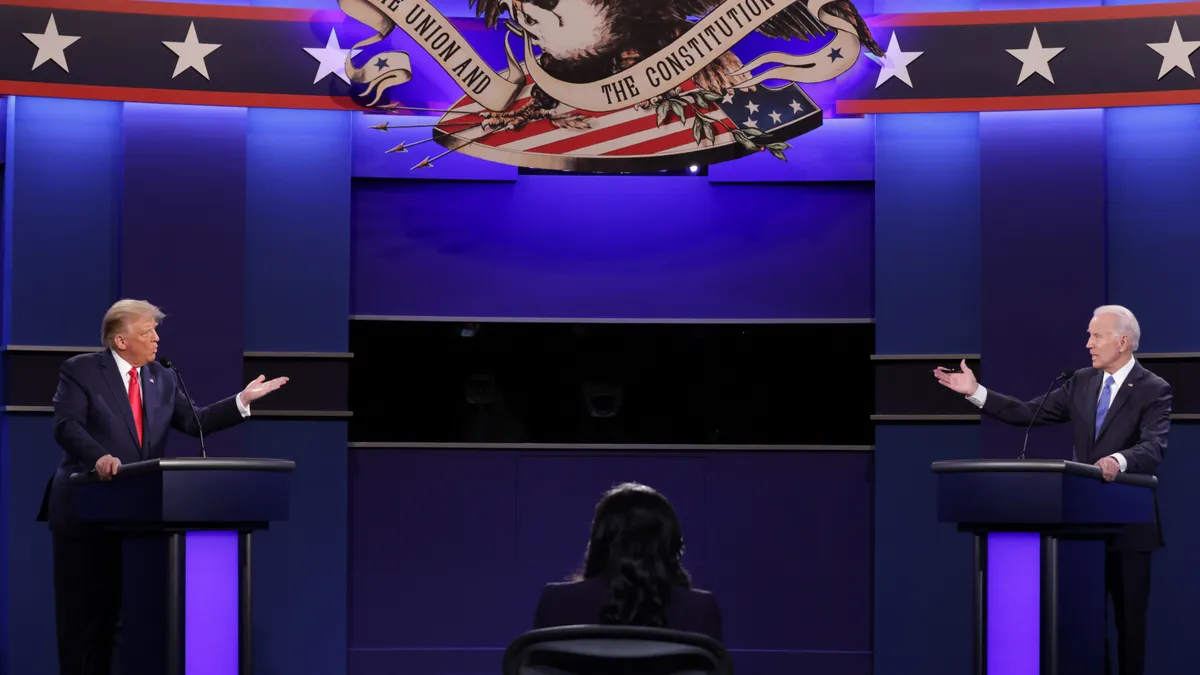November is a long way off, but the equally anticipated and dreaded 2024 U.S. presidential election has already hit a fever pitch. With nine months to go, the major parties’ candidates appear set and the nation is off to the political races.
Between current president Joe Biden and former president Donald Trump, pharma companies find themselves between a rock and a hard place — both candidates have expressed an urge to reform the industry, although in different ways. And of course, voters are likely to respond to those desires on top of other pressing domestic and international concerns.
But what should pharmas actually expect as the election cycle trundles on? Will the outcome be significant on a fundamental level when both candidates are pointing fingers? In a PharmaVoice readers’ poll last week, more than half of participants (53%) said they believe the election will in fact be impactful to the industry in one way or another. Only about 1 in 5 (22%) said no, and about a quarter (25%) weren’t sure what to think yet.
The candidates’ wildly different statements, policies and ideas about how to change the industry hint at some of the ways they might lead if elected and how pharmas might be affected over the course of the ensuing four years.
Drug pricing
“We finally, after all these years, beat Big Pharma when I signed the Inflation Reduction Act to get seniors and taxpayers a better deal.” — Joe Biden, Dec. 14, 2023
The Inflation Reduction Act has become one of the Biden administration’s widest-reaching pieces of legislation, aiming to recover the economic losses during the pandemic and achieve some political goals along the way. One of those goals was to allow the agency that runs Medicare to negotiate drug prices with pharma companies.While the policy would potentially reduce drug costs for millions of older Americans, the pharma industry has fought hard against what it has collectively called a form of “price control.”
For all intents and purposes, neither the pharma industry nor the Biden administration see themselves holding hands into the sunset. White House memos titled “President Biden Takes On Big Pharma and Is Lowering Prescription Drug Prices” don’t paint the president as a friend to drugmakers. In that Feb. 1 notice, the administration blamed Big Pharma for “price gouging” and drew a line in the sand against the status quo of pharma price setting.
All said, a win for Biden in November could make changes to the IRA more difficult, and with drug prices a core tenet of his campaign, the pharma industry would likely remain in the crosshairs.
“In four short years, we’ve instituted the most dramatic series of drug pricing reforms in decades, and you’ll see that.” — Donald Trump, Nov. 20, 2020
Trump’s campaign has also rallied support around reducing drug costs even though he has spoken against the IRA for other reasons, including aspects addressing climate change, and members of the Republican party in Congress have called for a repeal of Medicare negotiation provisions.
During the twilight of his presidency, Trump issued an executive order referred to as the “most favored nation” proposal, which would have used international reference prices to lower drug costs in the U.S. Although the Centers for Medicare & Medicaid Services pulled the model, Trump’s effort demonstrated that he, too, might look for ways to reduce drug costs in a second term, impacting pharma negatively — however, drug pricing has not been as central to his campaign this time around, according to reports.
But drug pricing is also where both candidates have shared a rare accord along the lines of a Trump-era policy affecting the way insurers and drug companies handle out-of-pocket drug costs — a policy Biden has defended during his own presidency. While pricing is a complicated issue that requires more than a single solution, the fact that the candidates see eye-to-eye on even one aspect of it is a rarity in today’s divided political climate.
Marketplace competition
“The Administration believes taxpayer-funded medications should be reasonably available and affordable.” —Biden-Harris Fact Sheet, Dec. 7, 2023
Biden has supported “march-in rights” that would allow certain drug and vaccine patents to be available to the public at lower prices. Although Biden voted to uphold the industry’s rights to keep patents to themselves as a senator in 1980, his about-face reflects his growing pharma antagonism.
The pharma industry vehemently opposes this action, arguing that the reduced incentives would threaten future innovation. And while the total impact of the patent policy is still unclear, the roadmap presented by the administration presents a potential future given another four years in office.
“You’ll be seeing drug prices falling very substantially in the not-too-distant future, and it’s going to be beautiful.” — Donald Trump, March 19, 2018
One way Trump aimed to help lower prices was through free market competition and promoting biosimilars. By signing a law in 2018 that gave the FTC greater access to deals involving biosimilars, Trump signaled that expensive biologics like AbbVie’s top-selling Humira could face more competition,, and since the law passed, the approval of biosimilars overall has risen steadily.
For the pharma industry, the biosimilars act has both helped and hurt the bottom line. Some companies like AbbVie have lost control of the market for drugs like Humira while others have gained traction due to their biosimilar pipelines. Many companies, like Amgen, Pfizer and Roche, are in both camps by selling both branded biologics and biosimilars.
COVID-19 and vaccines
“The gold standard vaccine has been done in less than nine months.” — Donald Trump, Dec. 8, 2020
Vaccine hesitancy once lived more on the fringes than in the rank-and-file U.S. mindset, but the pandemic changed that — and despite the federal government’s Operation Warp Speed efforts to develop vaccines against the virus that causes COVID-19, Trump became a firebrand for voters in that camp.
For pharma, a second Trump presidency could be a mixed bag. He rarely discusses the vaccine development effort on the campaign trail and, according to a Kaiser Family Foundation report, “Trying to predict Trump’s priorities in a second term is even more difficult given that he frequently changes his positions on issues, sometimes multiple times.”
“Before I took office, we hadn’t ordered enough vaccine[s] for every American. Just weeks in office, we did.” — Joe Biden, Sept. 9, 2021
Biden wasn’t president at the outset of the COVID pandemic, but he inherited the effort from the previous administration and has pushed vaccines in a more direct way than Trump. However, despite the ups and downs of U.S. infections, the COVID pandemic has not been a central campaign issue for Biden.
The Biden campaign has made online misinformation a target, though, and efforts to combat false medical content surrounding the pandemic and vaccines are a big part of that.












